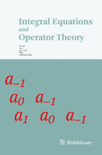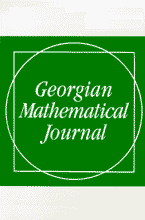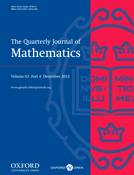
INTEGRAL EQUATIONS AND OPERATOR THEORY
Scope & Guideline
Bridging theory and application in mathematics.
Introduction
Aims and Scopes
- Integral Equations:
Research on various forms of integral equations, including Volterra and Fredholm equations, exploring their solutions, properties, and applications. - Operator Theory:
Study of linear operators on Hilbert and Banach spaces, including their spectral properties, compactness, and applications to functional analysis. - Functional Analysis:
Investigation of function spaces and their properties, particularly in relation to operators, including topics like reproducing kernel Hilbert spaces and Banach spaces. - Quantum Theory and Applications:
Exploration of mathematical frameworks in quantum mechanics, including operator algebras and quantum harmonic analysis. - Mathematical Physics:
Application of integral equations and operator theory to problems in mathematical physics, including quantum mechanics and PDEs. - Numerical Analysis:
Development of computational techniques and numerical methods for solving integral equations and operator-related problems. - Algebraic Structures and Operator Algebras:
Study of various algebraic structures associated with operators, including C*-algebras and von Neumann algebras.
Trending and Emerging
- Quantum Harmonic Analysis:
An increasing number of publications are exploring connections between operator theory and quantum harmonic analysis, reflecting the growing interest in quantum methods and their mathematical foundations. - Noncommutative Geometry and Operator Algebras:
There is a trend towards research in noncommutative geometry and its applications within operator algebras, indicating a shift towards more abstract and interdisciplinary approaches. - Advanced Spectral Theory:
A noticeable increase in studies related to spectral properties of operators, particularly in the context of infinite-dimensional spaces and their applications. - Optimization and Functional Spaces:
Emerging research focuses on optimization problems related to integral operators and functional spaces, reflecting broader applications in various mathematical and practical contexts. - Connections with Machine Learning and Data Science:
New themes are appearing that connect integral equations and operator theory with machine learning, indicating a modern application of these mathematical concepts in technology and data analysis.
Declining or Waning
- Applications of Integral Equations to Classical Physics:
There has been a noticeable decrease in papers specifically addressing classical physics applications of integral equations, as newer research trends lean towards quantum and modern physics applications. - Basic Theory of Classical Operator Theory:
The foundational aspects of operator theory, which were previously emphasized, are becoming less frequent as the focus shifts towards more advanced and specialized topics. - Elementary Numerical Methods:
Research focused on basic numerical methods for solving integral equations has declined, likely due to the development of more sophisticated techniques and computational methods.
Similar Journals

Dissertationes Mathematicae
Fostering Interdisciplinary Connections in Mathematics.Dissertationes Mathematicae is a prestigious academic journal published by the Polish Academy of Sciences Institute of Mathematics (IMPan), renowned for its contributions to the field of mathematics since its inception. With an impressive Q1 ranking in the miscellaneous mathematics category for 2023 and positioned at Rank #73 out of 399 in General Mathematics according to Scopus, this journal serves as a pivotal platform for disseminating high-quality research and innovative theoretical developments. Spanning from 2000 to 2024, it focuses on a broad range of mathematical disciplines, encouraging interdisciplinary collaboration and advancing mathematical understanding globally. While it currently does not offer open access, the journal is highly regarded in academic circles and continues to attract submissions from respected researchers and institutions. With a commitment to excellence and a notable impact factor, Dissertationes Mathematicae plays a crucial role in the ongoing development of mathematical theories and applications, making it an essential resource for researchers, professionals, and students alike.

Journal of Mathematical Analysis
Unveiling Insights in Applied Mathematical ResearchThe Journal of Mathematical Analysis, published by UNIV PRISHTINES in Serbia, offers a dedicated platform for the dissemination of innovative research in the fields of mathematical analysis and applied mathematics. With an ISSN of 2217-3412 and a convergence period from 2020 to 2024, this journal aims to foster significant advancements in both theoretical and practical aspects of mathematics. Categorized in the Q4 quartile for Analysis, Applied Mathematics, and miscellaneous Mathematics as of 2023, it serves as an essential resource for researchers and professionals alike, providing key insights into the evolving landscape of mathematical inquiry. Although it is an open access journal, facilitating global readership, its Scopus rankings reflect its emerging status, with rankings indicating a 51st percentile in Mathematics (miscellaneous) and 28th percentile in Applied Mathematics. This journal not only aims to contribute to academic discourse but also seeks to bridge gaps between mathematical theory and real-world applications, making it a vital resource for students and professionals engaged in the complexities of mathematical research.

Georgian Mathematical Journal
Fostering innovation in mathematical theory and application.Georgian Mathematical Journal, published by Walter de Gruyter GmbH, is a prestigious academic journal dedicated to the field of mathematics, particularly in its multifaceted applications and theoretical explorations. With an ISSN of 1072-947X and an E-ISSN of 1572-9176, this journal is indexed within notable databases and holds a strong position as evidenced by its Q2 ranking in the Mathematics (miscellaneous) category as of 2023 and a ranking of #140 out of 399 in the general mathematics Scopus category, placing it in the 65th percentile for research visibility. Since its inception in 1994, the journal has continued to evolve, aiming to foster innovative research and scholarly communication among mathematicians worldwide. Although it does not offer Open Access, the journal’s commitment to quality and rigor ensures that published works are of high relevance, appealing to researchers, educators, and students who are dedicated to advancing mathematical knowledge across diverse domains.

Constructive Mathematical Analysis
Unlocking New Perspectives in Constructive Mathematical ScienceConstructive Mathematical Analysis is a distinguished open-access journal dedicated to advancing the field of mathematical analysis, specifically through constructive methods. Published by Tuncer ACAR and affiliated with Selcuk University in Turkey, this journal has been making a significant impact in the academic community since its inception in 2018. With an emerging presence in Scopus, it has earned a Q2 ranking in key categories including Analysis, Applied Mathematics, and Numerical Analysis for 2023, reflecting its commitment to high-quality research contributions. By providing a platform for innovative research and interdisciplinary approaches, "Constructive Mathematical Analysis" aims to facilitate collaboration among researchers, educators, and students in their pursuit of knowledge in mathematical science. With its open-access model, the journal ensures that research findings are accessible to a global audience, fostering an inclusive academic environment.

Pure and Applied Mathematics Quarterly
Exploring the Depths of Theoretical and Practical MathematicsPure and Applied Mathematics Quarterly is a prestigious journal published by INT PRESS BOSTON, INC, focusing on the diverse and evolving field of mathematics. Since its inception in 2007, this journal has grown significantly, currently holding a Q1 ranking in the Mathematics (Miscellaneous) category for 2023, positioning it among the leading publications in the discipline. With a commitment to publishing high-quality research, Pure and Applied Mathematics Quarterly fosters innovation and dialogue within the mathematical community by providing a platform for theoretical advancements and practical applications. The journal remains accessible to researchers and professionals through its ISSN 1558-8599 and E-ISSN 1558-8602, although it does not currently offer open access. As a vital resource for mathematicians, educators, and students, this journal endeavors to expand the frontiers of mathematical knowledge and contribute to the academic dialogue surrounding this fundamental science.

Annals of Functional Analysis
Elevating Knowledge in Functional Analysis and BeyondAnnals of Functional Analysis is a distinguished international peer-reviewed journal published by SPRINGER BASEL AG that focuses on the interdisciplinary study of functional analysis, encompassing areas such as algebra and number theory, analysis, and control and optimization. With its ISSN 2639-7390 and E-ISSN 2008-8752, the journal is recognized for its significant contributions to research, currently holding a Q2 ranking in its category as of 2023. Spanning from 2010 to 2024, the journal aims to foster innovation and facilitate collaboration among researchers, professionals, and students by offering open access to high-quality articles and studies that push the boundaries of functional analysis. Based in Iran, Annals of Functional Analysis stands out as an essential platform for advancing the knowledge and application of functional analysis in both theoretical and practical domains, making it an invaluable resource for those dedicated to the field.

Complex Analysis and Operator Theory
Advancing the Frontiers of MathematicsComplex Analysis and Operator Theory, published by Springer Basel AG, is a renowned journal in the field of applied and computational mathematics, reflecting a strong engagement with contemporary mathematical challenges. With an ISSN of 1661-8254 and E-ISSN 1661-8262, this journal provides a platform for disseminating significant findings and innovative methodologies that contribute to the advancement of complex analysis, operator theory, and their diverse applications. As a valuable resource for researchers and practitioners alike, it features high-quality peer-reviewed articles that rigorously explore both theoretical and practical aspects of mathematics. Although it currently does not offer open access, readers can access its insightful content through institutional subscriptions or individual purchases. Since its inception in 2007, the journal has carved a niche for itself, evidenced by its placement in the Q2 quartiles in both Applied Mathematics and Computational Mathematics, and its recognition in Computational Theory and Mathematics. With an ambitious goal to foster the dialogue between theory and practice, Complex Analysis and Operator Theory continues to support the mathematical community from its base in Basel, Switzerland.

QUARTERLY JOURNAL OF MATHEMATICS
Championing Excellence in Mathematical ScholarshipQuarterly Journal of Mathematics, published by Oxford University Press, stands as a pivotal resource for the mathematical community, focusing on a broad spectrum of topics in the field of mathematics. With its esteemed history dating back to 1930, this journal continues to foster innovative research and discussions, providing a platform for scholars to share their findings and insights. Although the journal currently holds a Q3 classification in mathematics (miscellaneous) and is ranked #207 among general mathematics publications in the Scopus database, its commitment to quality and rigorous peer review ensures that it remains relevant and insightful. Researchers, professionals, and students alike will find the Quarterly Journal of Mathematics an invaluable tool for advancing knowledge and understanding in various mathematical disciplines, making it an essential addition to any academic library.

CZECHOSLOVAK MATHEMATICAL JOURNAL
Bridging Concepts, Building KnowledgeCzechoslovak Mathematical Journal is a distinguished academic journal published by Springer Heidelberg, dedicated to advancing the field of mathematics through the dissemination of high-quality research. With an ISSN of 0011-4642 and E-ISSN 1572-9141, this journal has been a pivotal platform for mathematicians and researchers from around the globe since its inception. The journal holds a Q3 ranking in the field of Mathematics (miscellaneous), demonstrating its commitment to providing a forum for the latest mathematical theories and applications, particularly in general mathematics, as indicated by its Scopus rank of #285/399 and 28th percentile in the field. While currently not offering open access options, the journal continues to attract a wide readership by making its valuable content available through traditional subscription models. The Czechoslovak Mathematical Journal serves as an essential resource for researchers, professionals, and students aiming to stay informed about recent developments and breakthroughs in mathematics, with focus years converging from 1995 to 2024.

Operators and Matrices
Connecting Scholars to the World of Algebra and Number TheoryOperators and Matrices is a distinguished academic journal dedicated to the fields of algebra, number theory, and analysis, published by ELEMENT. Operating from Croatia since its inception in 2009, this journal provides a vital platform for groundbreaking research, aiming to foster advancements in mathematics through the publication of high-quality articles. With an ISSN of 1846-3886, it has secured a respectable Q3 category ranking in both the Algebra and Number Theory and Analysis categories according to the latest metrics. Current Scopus rankings position it at #83/119 in Algebra and Number Theory and #153/193 in Analysis, indicating its growing influence in the academic community. Although it does not provide open access, the journal strives to promote a robust exchange of ideas and methodologies that illuminate complex mathematical concepts, thereby appealing to researchers, professionals, and students alike. By contributing to Operators and Matrices, scholars can place their work within a significant context, advancing their professional footprint in the mathematical landscape.